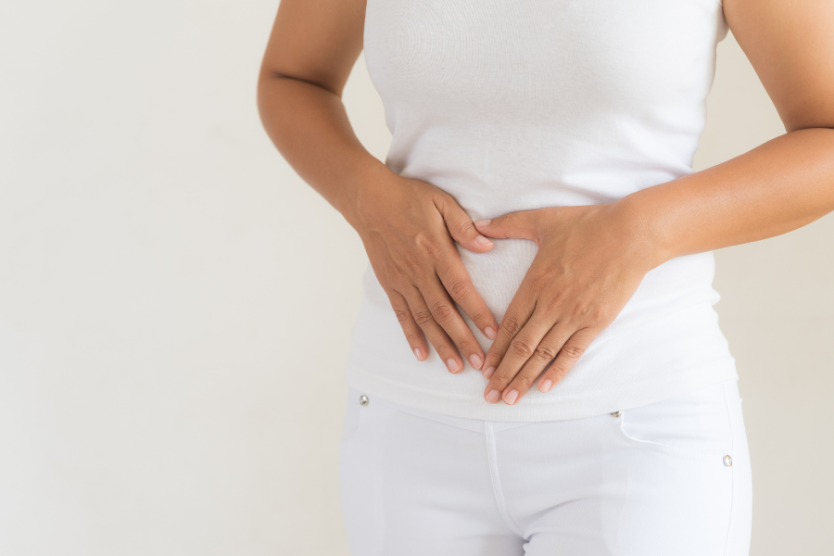Finding out you have uterine polyps evokes a lot of concern along with questions.
There are so many answers you will be seeking, as is the case with any type of diagnosis that’s out of the ordinary. It’s no different in the case of uterine polyps. What does it mean for your future health? What are some of the symptoms and side effects?
And many women ask, do uterine polyps cause weight gain and bloating?
Here are some things to know about uterine polyps and their side effects.
What Are Uterine Polyps?
Polyps are growths that are attached to the inner wall of the uterus or uterine lining and extend into the uterine cavity. Polyps are formed by an overgrowth of cells in the lining of the uterus. Polyps are usually non cancerous, although some can be cancerous or can eventually turn into cancer.1
There are other types of growth, fibroids and cysts, which are sometimes mistaken for polyps. Cysts, fibroids and polyps can have related symptoms but different causes, treatment, and potential complications.
It’s important to seek diagnosis if you notice the following symptoms typical of uterine polyps:1
- Irregular menstrual bleeding, which can include frequent, unpredictable periods of variable length and heaviness
- Excessively heavy menstrual periods or bleeding between menstrual periods
- Vaginal bleeding after menopause
- Infertility
Polyps can also cause some discomfort in the bladder, and pain or cramping in the pelvic area, including in the hips and legs and during sexual intercourse.2
Polyps and Weight Gain
While it’s true that being overweight can be a risk factor for developing uterine polyps1, does the presence of polyps cause weight gain or bloating?
It appears that other growths of the female reproductive system can cause weight gain and bloating more often than polyps. Uterine polyps range in size, and women can have one or several polyps. A small polyp, for instance, may create a different feeling than one the size of a golf ball, which is about as big as a polyp typically grows.3
Contrast that to a fibroid, which can grow as large as or larger than a grapefruit.3
Fibroids can cause weight gain in the abdomen when they grow large, or when women experience more than one fibroid. If you experience a bulge, gain weight, or feel or appear bloated, it’s a good idea to see a doctor.4
The symptom of weight gain, then, typically appears when you have fibroids, which are often confused with polyps.5 An increase in abdominal size is a side effect of fibroids, a very common condition in which some estimates cite that up to 70 percent of women will have by the age of 50.6
Large fibroids can also cause issues when they press on the other organs in the abdomen and pelvis. That harm can cause noticeable symptoms or create a “silent harm,” such as reducing the flow of urine from the kidneys. Blood clots can also be a concern.6
Here are other reproductive conditions that can have similar symptoms to polyps and can lead to weight gain:
Endometriosis: this condition arises when tissue similar to the uterine lining grows elsewhere in the body. There is anecdotal evidence linking endometriosis to weight gain, but research hasn’t found a scientific link. If you have endometriosis and you have weight gain or are having trouble losing weight, you should see a doctor.7
Endometriosis is also sometimes linked to feeling bloated.8 Bloating can make your weight fluctuate and make you look and feel heavier, as well as change how your clothes fit.7
Polycystic ovary syndrome (PCOS): mimics the symptoms of endometriosis and can lead to unexplained weight gain.7
So while weight gain is not a common symptom of uterine polyps, unusual weight gain may happen if you have another condition.9 And it’s also true that pain, heavy bleeding, fatigue and other conditions can impact our ability to stay healthy.
For instance, a condition of the reproductive system might make it hard to stay active, eat properly, and sleep well; it could make you turn to alcohol or painkillers; and, these changes could in turn cause weight gain.
Seek Diagnosis
If you are suffering from conditions like bleeding between periods, weight gain and bloating, or a bulge in your abdomen, you should see a doctor to receive a proper diagnosis.
Use our Physician Finder to find a doctor near you with expertise in women’s health, who can help with your health concerns.




















